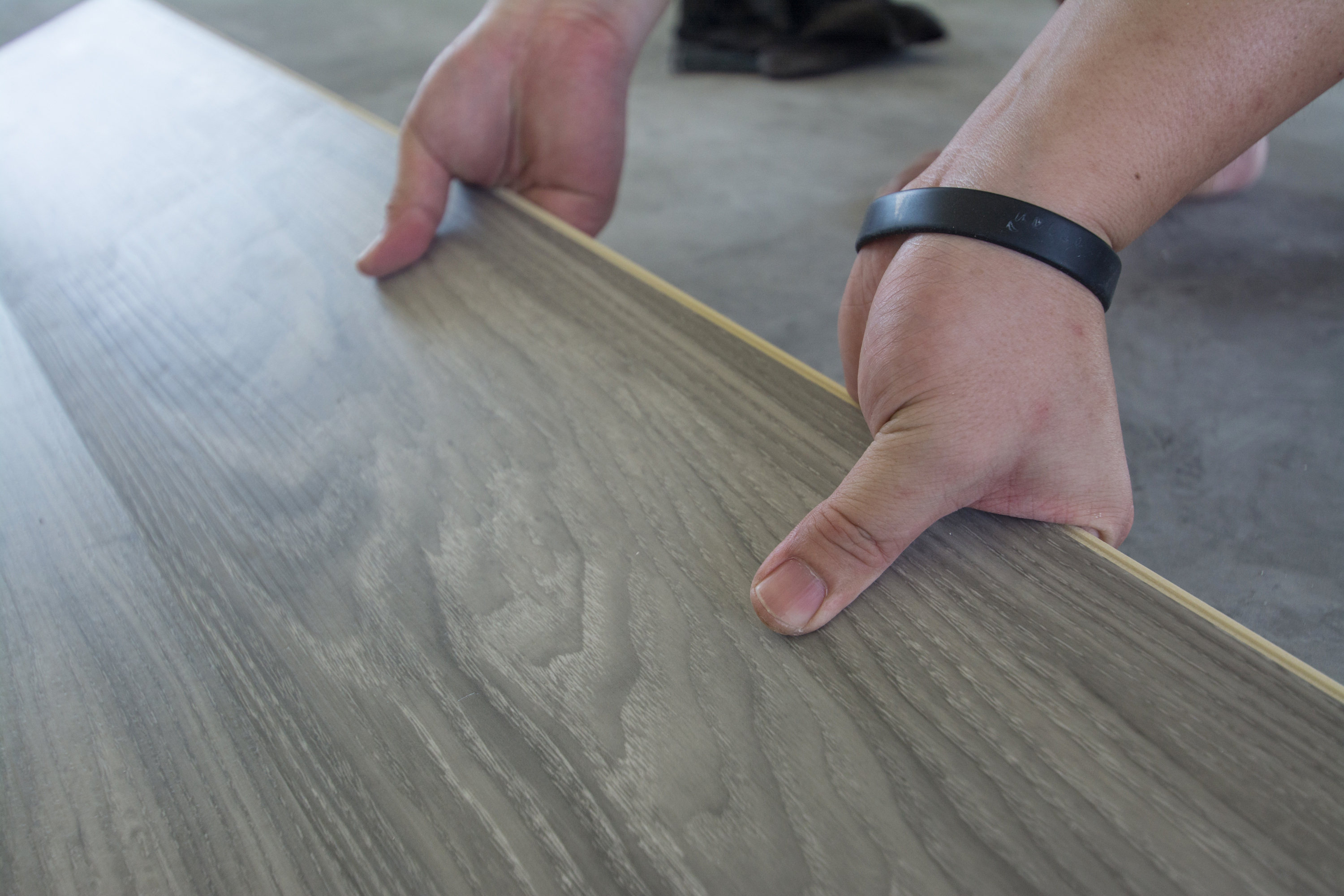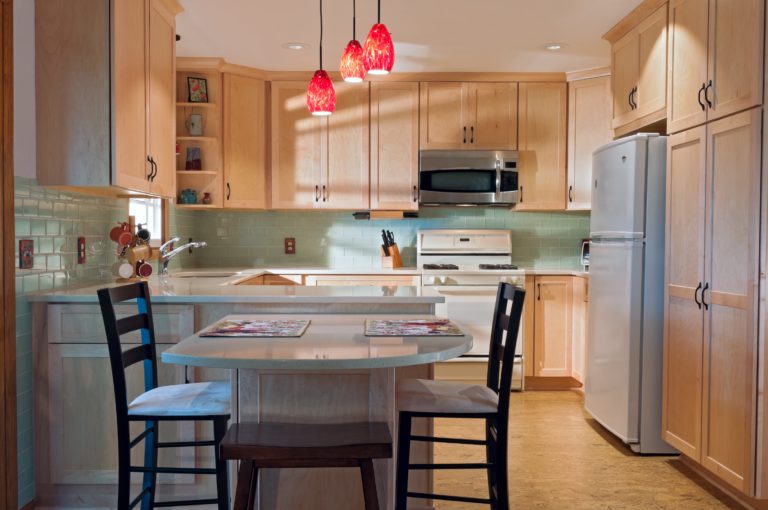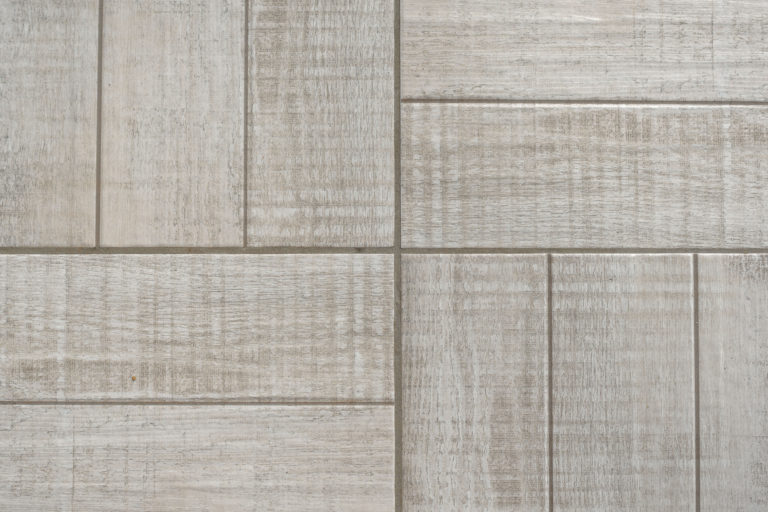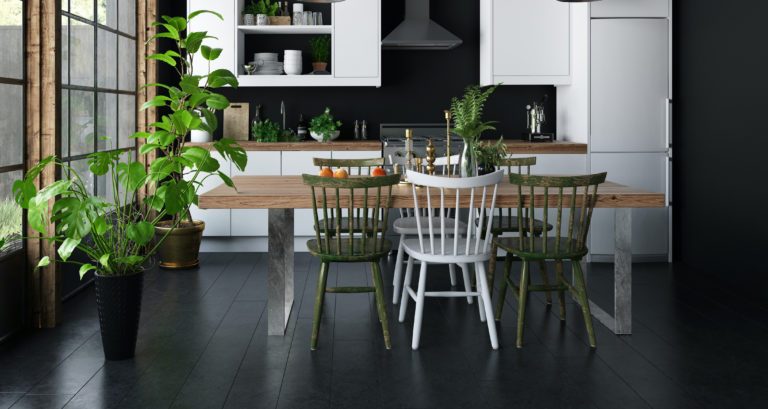This post may contain references or links to products from one or more partners of our parent company and/or subsidiaries of our parent company. For more information, visit this page.
May 4, 2021
So: what’s the difference between flexible core and rigid core luxury vinyl flooring? Is one better than the other? Do some brands sell one, but not the other?
While these are pretty simple questions, their answers are surprisingly complex. That’s why below, we’re going to explain everything you need to know about flexible and rigid core luxury vinyl flooring.
We’ll discuss the differences between the two products, see how they compare to one another (and to other types of flooring), and finally, go over some rigid core products offered by the best vinyl plank flooring brands that we’d recommend looking into.
What is Luxury Vinyl Plank Flooring (LVP)?
Before we get into the nitty-gritty details, let’s clear up some general concepts.
Luxury vinyl plank flooring, or LVP, checks just about every box on the things-you-want-in-a-floor checklist. It’s seriously tough, easy to install, decently priced, and long-lasting. In fact, of all the types of flooring on the market, LVP may present the best overall value.
As a type of PVC flooring, LVP is made of polyvinyl chloride—a hardy and versatile plastic that’s used in everything from water pipes to old records (yep, it’s the same material). And unlike the sheet vinyl of yesteryear, it looks more like real wood or tile than it does linoleum (you can learn about the differences between linoleum vs. laminate vs. vinyl, if you’re curious).
Most importantly for us, LVP can come as either a flexible or rigid core product.
LVP vs. LVT: Is There a Difference?
You may have heard luxury vinyl called “LVT” before. Is there a difference between LVT and LVP?
LVT, or luxury vinyl tile, is nearly identical to LVP—but it’s cut into tiles instead of planks. LVP also tends to mimic hardwood, while LVT tends to mimic stone or tile.
Most people use the terms interchangeably, and since wood-look options are the more popular luxury vinyl products, we mostly use the terms “vinyl plank” or “LVP”.
How Is Luxury Vinyl Flooring Made?
Just about all luxury vinyl products start with the same basic layers. From the bottom up, they are:
- A core layer that provides a foundation for the floor.
- A design layer that gives the floor its look and feel.
- A wear layer that protects the floor.
Some brands also come with a pre-attached backing layer (or underlayment) that’s not technically part of the floor, but provides various benefits.
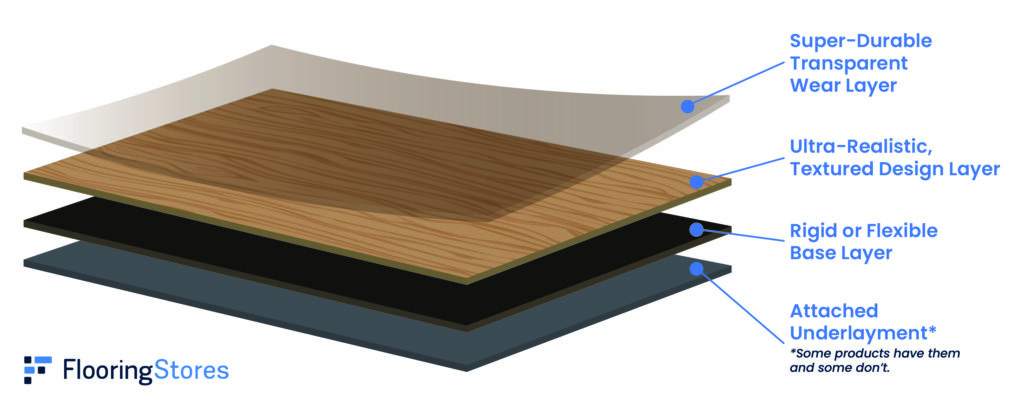
Best Brands of 2024
What Is Rigid Core Luxury Vinyl Flooring?
Now we’re getting to the meat and potatoes! As we mentioned earlier, you can find flexible or rigid core luxury vinyl flooring products (both LVP and LVT). And frankly, rigid core luxury vinyl is an improvement over flexible luxury vinyl in just about every way.
Rather than using just another piece of flexible vinyl, rigid core luxury vinyl floors use specialized, hardened core layers to provide tons of extra benefits.
There Are 3 Main Types of Rigid Core Luxury Vinyl Flooring
Generally speaking, there are 3 main options when it comes to rigid core luxury vinyl. Each one brings different benefits to the table. We’ll discuss this in a lot more detail further down, but these main types of rigid vinyl cores are:
- Stone-polymer composite (SPC)
- Wood-polymer composite (WPC)
- Standard rigid core (100% hardened vinyl)
Side Note: Are EVP Flooring and Rigid Core Luxury Vinyl the Same Thing?
Engineered vinyl plank, or EVP flooring, and rigid core luxury vinyl flooring are two different names for the exact same product.
The flooring industry is pretty crowded, so different brands tend to invent new names to make their products stand out. When we talk about “EVP”, we’re just talking about rigid core luxury vinyl flooring.
What About RVP Flooring?
RVP and rigid core luxury vinyl flooring are also the same thing. RVP simply stands for “rigid vinyl plank”. So many acronyms!
The 3 Different Types of Rigid Core Luxury Vinyl Flooring
Like we said, there are 3 main types of rigid core luxury vinyl flooring: SPC, WPC, and plain ol’ hardened vinyl. You’ll find that many, if not most of the best vinyl floors are either SPC or WPC. These two rigid core types serve different purposes, but they’re both excellent. The third category—hardened vinyl—is only a slight upgrade over flexible LVP.
Here’s how they work.
SPC Flooring
SPC flooring (which again, stands for stone-polymer composite) is a significant upgrade from flexible luxury vinyl in terms of durability and comfort. Its stone-infused rigid core makes it extremely tough and capable of repelling most of the common dangers that floors face.
WPC Flooring
WPC flooring, on the other hand, is rigid core luxury vinyl flooring made with a wood-polymer composite. This core is bouncy, natural-feeling, and super comfortable to walk on—just like real hardwood!
Hardened Vinyl
Standard rigid core luxury vinyl flooring is an improvement over flexible vinyl, but only slightly. In fact, the only difference between them is the density of the vinyl in the core.
Translation: these floors are nowhere near as durable as SPC flooring and they do absolutely nothing to enhance comfort (unlike WPC).
Flexible vs. Rigid Core Vinyl: How Are They the Same?
Before we compare rigid core vs. flexible LVP any further, let’s talk about how they’re the same.
Flexible and Rigid Core Luxury Vinyl Flooring Are Both Waterproof
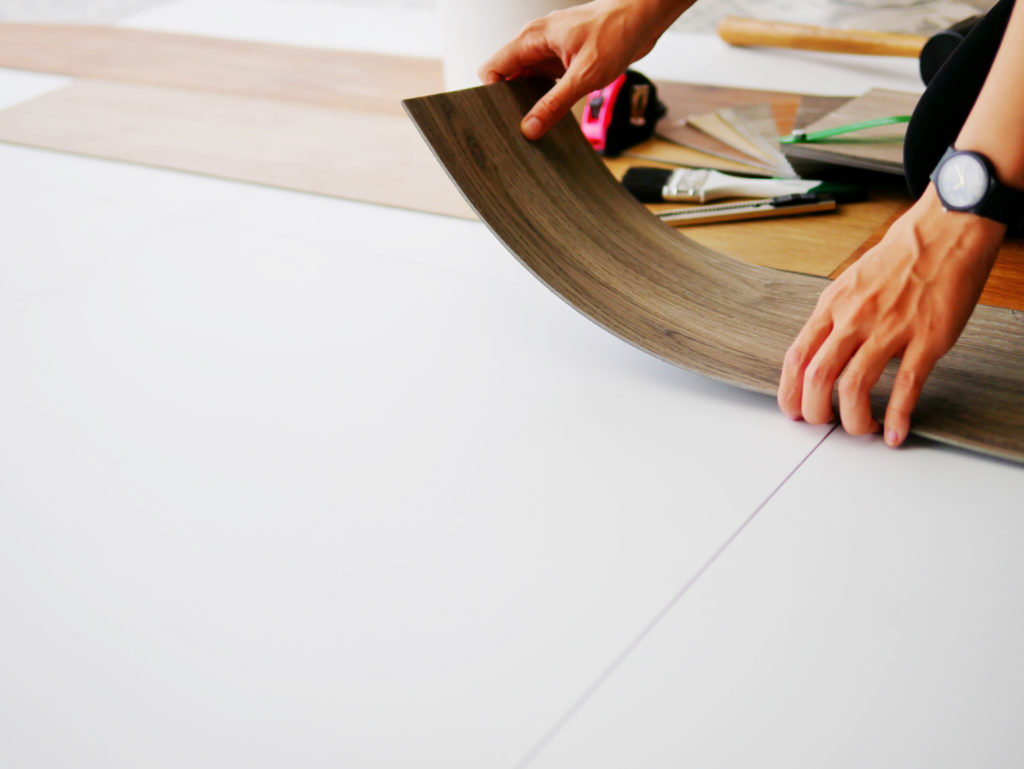
Aside from a few (very) low-quality brands, both flexible and rigid core LVP are 100% waterproof—so long as you install them correctly. For example, Pergo reviews note that the company’s rigid LVP floors are completely waterproof, provided they’re installed according to manufacturer specifications.
All of that to say: if you’re installing laundry room, basement, or mudroom flooring, any type of waterproof vinyl flooring will be preferable to water-resistant wood flooring. Why? Teak flooring is a good example. Teak is water-resistant, but if you leave standing water on it too long, its finish could degrade or the wood could warp. So again: flexible and rigid core luxury vinyl are both waterproof, and both will remain so as long as they’re put in properly.
Flexible and Rigid Core Luxury Vinyl Are Both Easy to Maintain
Unlike most hardwood species, neither flexible nor rigid core LVP has any special care requirements. Since they’re both waterproof, a regular mop and bucket are perfectly safe to use.
One potential caveat: some low-end vinyl floors react badly to certain cleaners, so read your manufacturer instructions carefully.
They Both Offer the Same (Easy) Installation Options…
If you’re looking for do-it-yourself flooring, rigid and flexible LVP are both pretty easy to install. There are three primary installation methods, regardless of the product’s core.
- Many vinyl products come as click-together flooring. These floors snap together with interlocking tabs and are laid down without any adhesives, nails, or staples. They’re the most popular types of floating floors (what is a floating floor?) and they’re super easy to install.
- Loose lay vinyl plank flooring is another type of floating floor laid down without any clicking mechanisms; instead, it uses rubber backings and weighted planks to keep it in place.
- Glue down vinyl plank flooring is the most secure method, but notably more tedious. It generally involves spreading glue over your subfloor and putting the planks down piece-by-piece, but some flexible core luxury vinyl products come with self-adhesive backings—so you can install them just like peel-and-stick carpet tiles.
And if you’re wondering how to install carpet tiles… well, it really is just as easy as it sounds.
…And Both Are Relatively Inexpensive to Install
Translation: the cost to install vinyl plank flooring, regardless of whether it’s rigid or flexible core, comes out to about $1.50 to $6.00 per square foot. Solid hardwood can easily be double that, and the cost to install engineered hardwood floors isn’t much better.
Why? Take hickory, for example. One of the big disadvantages of hickory flooring: it’s insanely hard to work with because the wood is so tough. So, you A) need special tools, and B) have to invest a lot of time to lay down each plank. Not so with vinyl.
Both Floors (Generally) Need a Vapor Barrier
We briefly mentioned that some vinyl plank products either come with or require a backing layer. There are two reasons for this:
- To add comfort.
- To protect the flooring and subflooring (what is subflooring?) from moisture-related dangers like mildew or mold.
…But Some Floors Come With Pre-Attached Underlayments
Some LVP products—whether they’re flexible or rigid core luxury vinyl flooring—come with pre-attached backing layers (or underlayments). Even if they don’t, underlayments are usually inexpensive.
Side note: if you want something high-tech, magnetic flooring underlayments will keep your floors in place without issue.
Flexible and Rigid Core LVP Both Come in Tons of Styles
There’s not a significant difference between flexible and rigid core luxury vinyl flooring in terms of available styles. If you’re debating between tile vs. wood floor looks, both variants offer plenty of stone and wood floor patterns—as well as styles that imitate mixed-width and wide plank wood flooring.
You can also use either one to install elaborate patterns like herringbone and chevron parquet flooring.
What Makes Rigid Core Luxury Vinyl Flooring Better Than Flexible?
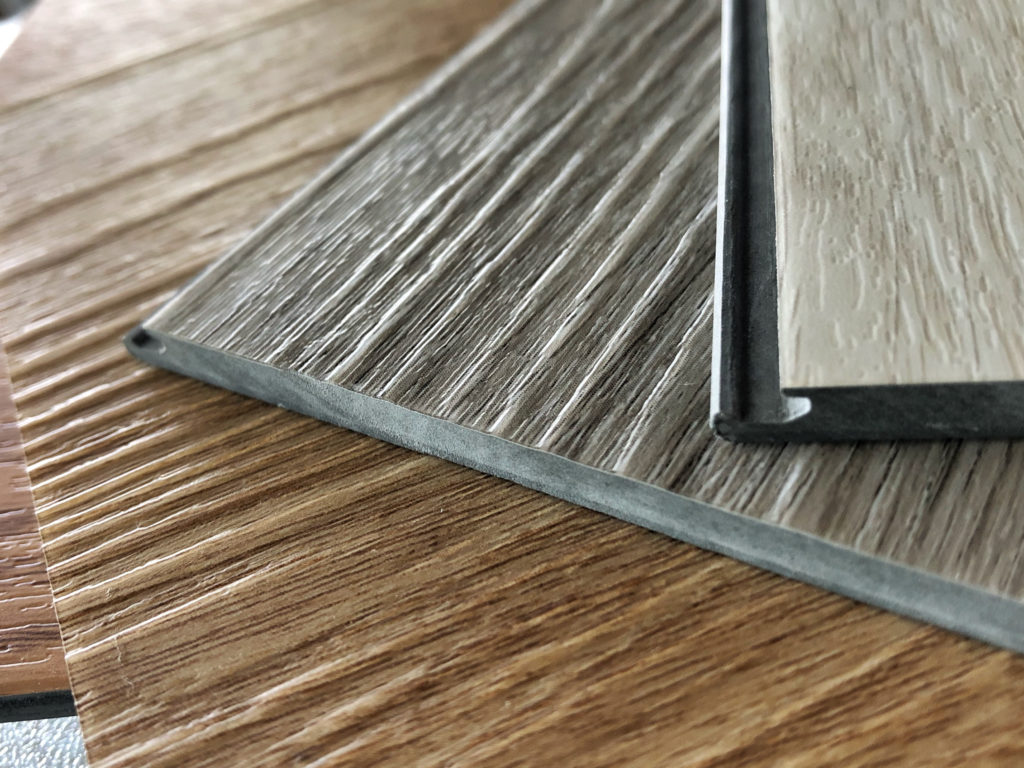
If these two types of flooring are so similar, what makes rigid core luxury vinyl so much better than its flexible cousin? As it turns out… kind of a lot. After all, there’s a reason so many of the best vinyl plank flooring brands only sell rigid-core products.
Rigid Core Luxury Vinyl Feels Better Than Flexible Core
The first reason might not be the most obvious—until the minute you step on your floor. Rigid core luxury vinyl flooring feels so much better than flexible vinyl. Think about it: with flexible vinyl, you’re essentially feeling your subfloor (and all the imperfections it might have)—because the flexible sheet molds to them!
And that means flexible LVP feels nothing like real hardwood or tile. So if you’re looking for something that’s going to fool the foot as well as the eye, rigid core luxury vinyl flooring is the way to go.
Rigid Core Luxury Vinyl Flooring is Way More Durable
Need scratch-resistant flooring? Rigid core luxury vinyl flooring is the choice for you. You might think flexible vinyl will make objects bounce, the way rubber would. Unfortunately, that’s not the case. Flexible cores aren’t bouncy—they’re just easy to penetrate.
Rigid cores can either reflect (SPC) or absorb (WPC) impact forces from steps and falling objects—meaning there’s something solid between the floor’s top layer and your subfloor.
Which Means it Comes With Better Warranties, Too
Because rigid core luxury vinyl flooring is so much more durable than flexible LVP, it tends to be backed by better warranties.
Take Stainmaster luxury vinyl. This flexible LVP product has an all-vinyl core and is backed by what we can only say is a horrendous warranty. Virtually anything you do to the floor—including walking on it too much—voids the warranty.
Most rigid core luxury vinyl warranties are better because brands know they’re less likely to have to replace those rigid core floors.
Rigid Core LVP Can Be Installed In More Places Than Flexible LVP
Flexible LVP can go almost anywhere inside your home, but it’s not intended as an outdoor flooring option. True outdoor vinyl flooring is actually pretty rare, but high-end EVP can safely be used for greenhouses or sunroom flooring.
The only thing we’d recommend: glue down your outdoor floors. One of the disadvantages of floating floors is that they can lift or warp in high heat. Bonus: if you were thinking about heating your rigid core luxury vinyl floors the same way you can heat wood floors, it’s totally doable!
So: Rigid Core Luxury Vinyl Flooring is Better Than Flexible Luxury Vinyl, Right?
The short answer: yes. In fact, rigid core vinyl goes a long way in fixing some of the worst disadvantages of vinyl plank flooring.
That said, there’re still a few things to watch out for:
Most Rigid Core Vinyl Flooring Reviews Say It’s Great!
Rigid core vinyl flooring reviews are largely unanimous in saying that these floors are great. Many of the best vinyl plank flooring brands make EVP products that stack up with—and in some ways surpass—the most durable wood flooring products they’re intended to replace.
…But Beware of Rigid Core Vinyl That Has a Pure-Vinyl Core
Some rigid core brands don’t specify whether their products use a WPC or SPC core. Anytime this happens, there’s a very good chance it’s pure PVC (NuCore flooring is a good example of this). And as we said before, these products aren’t a huge improvement over flexible vinyl.
So: anytime you’re looking to buy EVP flooring, make sure you check what the core is made of.
And Beware of Box Store Brands
Big box stores have a reputation for selling mediocre flooring products. For example, Lowes’ SmartCore flooring comes in both WPC and SPC rigid core varieties, but both suffer from durability concerns.
Home Depot’s claims about its flagship LVP, LifeProof vinyl flooring, are pretty similar (and so are the reviews).
Our recommendation: go with a real flooring store instead because they usually carry better products.
The One Downside: Rigid Core Luxury Vinyl Flooring Is Usually More Expensive
Like any premium option, rigid core luxury vinyl flooring is generally more expensive than flexible LVP, which tends to run between $1 and $4 per square foot. That said, you can still find plenty of rigid core options at or around $4.00 per square foot (which can be half as much as normal wood flooring costs or less).
Is LVP a Good Substitute for Hardwood?
LVP is the premier fake wood flooring option; it does a fantastic job of imitating the look and feel of many types of wood flooring. Unless you’re an expert, it can be hard to tell the difference these days (especially with a high-quality LVP floor).
LVP also tends to be a lot cheaper than hardwood (to buy and install), which is great because the price of buying hardwood floors can easily reach five figures—even for small rooms.
Is LVP a Good Substitute for Natural Stone?
LVP is one of the best hardwood floor alternatives out there, but it’s also great at imitating the look and feel of tile and stone!
Many types of tile and stone floors are reasonably priced, but if you’ve ever tried to install them then you know how much of a pain they can be. LVP cuts the hassle in half and it’s also easier to clean and maintain (cleaning between tiles and regrouting gets old, fast).
Is EVP Flooring Safe? Yes.
Remember: EVP stands for engineered vinyl plank, which is just another way of saying rigid core luxury vinyl plank flooring. And to answer the question, yes—rigid core luxury vinyl flooring is safe to put in your home. However, there are two things to consider:
Most Vinyl Brands Offer Low-VOC Flooring Options…
Harmful volatile organic compounds (VOCs) can be emitted by many household objects—including flooring. The danger isn’t immediate, but sensitive groups and pets may experience adverse reactions to VOCs. This is definitely something to think about with vinyl, since plastics can contain larger amounts of VOCs than natural products.
However: low-VOC flooring is becoming the standard, and fortunately, most rigid core luxury vinyl brands offer zero-VOC or low-VOC vinyl flooring products.
That said, if even trace amounts of VOCs are concerning to you, we’d recommend checking out our eco-friendly flooring guide.
…But Vinyl Isn’t Especially Environmentally Friendly in General
On the subject of environmentally-friendly flooring: it has to be said that most vinyl flooring isn’t particularly green. While sometimes recyclable, plastics can’t be produced or disposed of the same way sustainable wood flooring options like pine flooring or Douglas fir flooring can.
So: if you’re looking for faux wood flooring options and want to stay super green, we’d recommend looking into something like cork or hemp flooring. The disadvantages of cork flooring aside, these materials both make great floors.
How Does Rigid Core Luxury Vinyl Compare to Other Types of Flooring?
Now that we’ve covered how rigid core stacks up against flexible LVP, let’s see how it compares to other types of flooring.
Rigid Core LVP vs. Solid Hardwood
Rigid core luxury vinyl flooring is generally used as a substitute for hardwood floors. It’s durable, you can use it to create the same wood floor designs… you get the picture.
But: when you’re working with solid wood, the best hardwood floors have trouble competing with rigid core vinyl’s waterproofing and ease of maintenance.
That said, well-maintained hardwood can last for the better part of a century in the right climate (and it can be refinished indefinitely). EVP can’t be refinished at all. Plus, the cost to refinish hardwood flooring every few years is generally cheaper than outright replacing your rigid luxury vinyl every couple of decades.
Rigid Core Luxury Vinyl vs. Engineered Hardwood
What is engineered hardwood? It’s a type of real wood floor made from a plywood base and a solid wood veneer. Which means the best engineered wood flooring has some advantages over solid hardwood: it’s easier to install, it’s more dimensionally stable, and it can run a bit cheaper.
However, there are a number of disadvantages of engineered wood. Like solid wood, it’s not waterproof. But unlike solid wood, you can only refinish it a handful of times (if at all). And that means it’s not as durable as vinyl plank—and it also lacks the longevity of solid wood.
That said, the best engineered wood flooring brands make stunning products. You can’t question engineered hardwood’s authenticity because it’s real wood. As great as EVP is, it’s 100% artificial.
Rigid Core Luxury Vinyl Flooring vs. Laminate Flooring
The vinyl plank vs. laminate debate is a hot topic—but what is laminate flooring, exactly?
The best laminate flooring takes a photorealistic image layer, protects it with a plasticate wear layer, and supports it with a fiberboard base. The end result is a floor that’s similar to LVP but uses slightly more natural ingredients (and feels a bit more natural as a result).
Non-toxic laminate flooring can even eliminate VOCs—and while older laminate products were very sensitive to water, new waterproof products like RevWood have started to narrow the gap between laminate and LVP.
So, which is better? Well, there are a few laminate products that are probably better than some rigid core luxury vinyl products, but the opposite is also true. It really depends on what you’re looking for! In general, laminate products might be a bit comfier (though WPC flooring would beg to differ), while rigid core vinyl products might be a bit more durable.
Sidenote: don’t be confused by the engineered hardwood vs. laminate debate—they’re entirely different floors. Remember, engineered hardwood is real wood; laminate is not.
Rigid Core Luxury Vinyl vs. Tile and Stone
We’ve mentioned wood-look rigid core luxury vinyl a lot here, but how do tile and stone-look EVP compare to real tile and stone? Well, stone and tile-look EVP are both some of the easiest flooring to install—whereas real stone and tile are not. Products like snap-together tile flooring do exist, but they’re not the norm, so installing real tile is expensive.
Otherwise, EVP does a great job of mimicking the look and feel of tile, with one exception: EVP is actually less likely to freeze your feet off when it’s cold. Plus, rigid core luxury vinyl flooring (and especially WPC) are more comfortable to walk over.
Oh, but if you’re still on a fake wood floor kick: wood-look tile and concrete flooring that looks like wood are viable alternatives too.
5 Great Rigid Core Luxury Vinyl Flooring Brands
It probably won’t come as much of a surprise that our top rigid core luxury vinyl brands are (more or less) also our top vinyl plank flooring brands in general.
#1: Proximity Mills
As in our best LVP breakdown, we’d have to award our top spot to Proximity Mills. Why?
Well, the company makes SPC flooring with all the bells and whistles you’d expect from a high-end performance manufacturer—thick ceramic-bead-infused wear layers for superb scratch resistance, low-VOC and zero-VOC options, high-quality visuals—but at a highly affordable price point (roughly $4.00/sq. ft., depending on the retailer).
Proximity Mills reviews are excellent, and in our opinion, the company’s 11 collections of SPC flooring offer the best price-to-performance ratio of any manufacturer on this list.
#2: Karndean
Karndean is the inventor of loose lay vinyl flooring. Aside from Proximity Mills, they’re the only brand here that offers it.
Their Da Vinci and Art Select collections are pretty expensive at about $8.00 per square foot (plus shipping, they’re an imported brand). However, they also make cheaper rigid core luxury vinyl flooring lines that aren’t quite as robust.
Regardless, all of Kardean’s products are backed by great warranties (limited lifetime for residential use; 10-year-minimum for commercial use). Just be careful: not all of Karndean’s offerings are rigid core.
#3: Shaw Floors
Shaw’s Floorté rigid core luxury vinyl flooring lines range between $5 and $10 per square foot. Aside from Armstrong, they offer the largest selection of EVP styles, including both wood and stone looks.
Shaw also offers both WPC and SPC, so buyers can choose to emphasize comfort or durability.
#4: COREtec
COREtec is owned by Shaw and also happens to be the inventor of WPC flooring. It doesn’t offer as many styles and collections as Shaw, but the products offer similar performance and pricing according to our COREtec flooring reviews.
#5: Armstrong Flooring
Armstrong Flooring offers an incredible amount of EVP styles and designs, including the largest collection of tile and stone looks. Their reviews aren’t as good as the others, but they’re still good and range from $4.00 to $7.00 per square foot.
Conclusion: Is Rigid Core Vinyl Flooring Good? It’s Amazing!
Rigid core luxury vinyl flooring is easily one of the best LVP options available. It’s relatively inexpensive, super tough, waterproof, and long-lasting.
Outside of a few issues, like its issues with outdoor use or its environmental impacts, EVP flooring is nearly perfect for most uses.
So: whenever you’re ready, we’d recommend finding a top-rated flooring store near you to continue your buying journey. Or, if you still looking for more info, check out some of the articles below. And either way, good luck finding your perfect floors!
- Your Guide to the Best Bamboo Flooring
- Bamboo Flooring vs. Laminate: Which to Buy?
- Engineered Bamboo Flooring: Pros and Cons
- Can You Refinish Bamboo Flooring? Here’s How
- 9 Reasons The “Carpet vs. Hardwood” Debate is Silly
- Carpet or Hardwood in Bedrooms: Which is Better?
- How Much Does it Cost to Replace Carpet With Hardwood?
- Tile vs. Laminate Flooring: The Pros and Cons
- The Pros and Cons of Cork Flooring
- The Best Cork Flooring Options & 11 Reasons They’re Awesome
- Can You Bleach Wooden Floors? Yes! Here’s How.
- Your Definitive Guide to Ash Flooring
- Hickory Flooring Pros and Cons: The Guide
- The 8 Best Types of Wood Flooring For Dogs
- The 12 Best Hardwood Floor Brands: Real Info & Reviews
- Prefinished Hardwood Flooring: Is it Right for You?
- Laminate vs. Hardwood Floors: Which are Better?
About The Author

Christian Southards
May 4, 2021
Christian is a freelance everything-writer, editor, and interior design nerd. When he’s not writing about flooring and remodeling, he’s either writing news for the California American Legion or working with his hands on his house. His favorite type of flooring is hardwood, but admits to having carpet in his bedroom.
